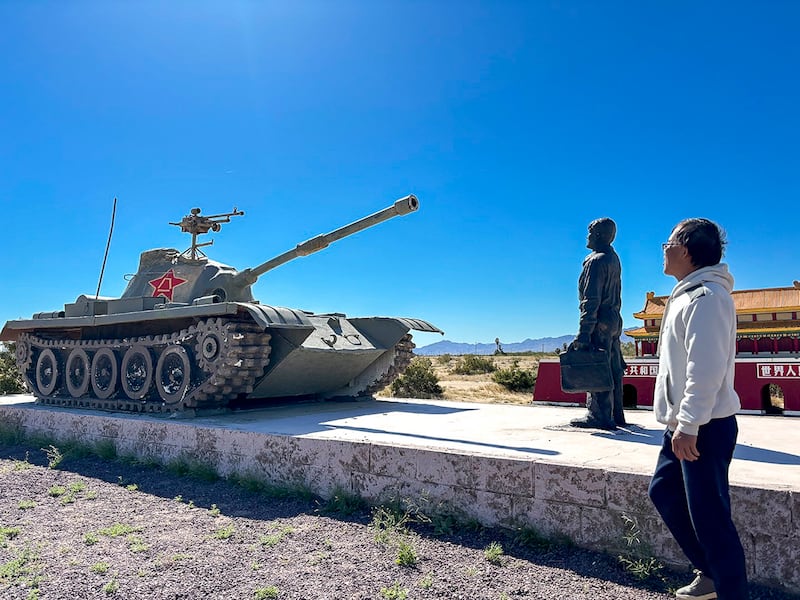Denied entry by Taiwan, veteran Chinese democracy activist Tian Yongde has arrived safely in the United States, where he is applying for political asylum following a hazardous trek through the Central American rainforest.
He fled China after repeatedly being hauled in by China's feared state security police for questioning, prompting his friends to warn that he could soon wind up in jail, he told RFA Mandarin in a recent interview.
"My friend warned me that I'd been put on a list, and that I should leave China as soon as possible,” he said. "They said people like me would be the first to be locked up if there were any big political changes, and there was no way of knowing if I would survive. I was very scared by that."
He became one of a growing number of Chinese to join the " run" movement of people fleeing China and eventually arriving at the U.S. border overland via Mexico.
Tian, who hails from the northern Chinese region of Inner Mongolia, has a long history of activism – including being one of the first people to sign Charter 08, a 2008 document co-authored by late 2010 Nobel Peace Prize winner Liu Xiaobo that called for constitutional government, and a former member of the banned China Democracy Party.
He left China for Thailand in November 2023, then took a flight from neighboring Malaysia to democratic Taiwan on Jan. 30, 2024.
Sent back by Taiwan
Tian and his traveling companions Wei Yani and Huang Xingxing all held temporary refugee cards issued by the United Nations High Commissioner for Refugees, or UNHCR, in Bangkok.
They arrived in Taiwan on a flight from Kuala Lumpur and declined to board an onward booking to Beijing, where they hoped to be allowed to wait for resettlement in a third country in Taiwan rather than Thailand, where the authorities have repatriated a number of dissidents wanted by China in recent years.
But Taiwan's Immigration Department sent the trio back to Malaysia on the morning of Feb. 1, saying that people shouldn't jump flights on the island, which has no refugee law and lacks a clear mechanism for handling political asylum claims.
RELATED STORIES
[ Chinese activists transiting at Taipei airport say they’re seeking asylumOpens in new window ]
[ Taiwan sends 3 Chinese nationals back to MalaysiaOpens in new window ]
[ Canada asylum-seeker recalls 'all kinds of torture' in Chinese jailOpens in new window ]
Wei, also a veteran activist, and her son Huang Xingxing have since arrived in Canada, where they are seeking political asylum.
From Kuala Lumpur, Tian started out on a long and tortuous journey via Morocco and Egypt to Quito, Ecuador, where he took the perilous people smuggling route known in China as " walking the line," all the way to the U.S. land border with Mexico.
Nearly swept away
He landed in Ecuador, which offers visa-free entry to Chinese nationals, on Feb. 23, and eventually crossed the border into the United States on April 21 after a grueling two-month journey.
At one point, he was nearly washed away by a turbulent rainforest river, he said.
"There was moss on the stones as we were crossing a river, and I slipped on it and I fell into the water," Tian said. "My backpack and everything I was wearing was drenched from head to toe."
Tian feels lucky to be alive after the incident.
"If someone hadn't grabbed me, I could have been swept away because the water was flowing so fast," he said.
In another hairy moment, he and his group were held up at gunpoint by unidentified people on the Mexico side of the U.S. border who demanded their money.
"They chased us then held their guns to our faces and demanded US$500 each," Tian said. "We said we didn't have much cash, so they told us we would have to go to the ATM to take it out."
Just then, the would-be robbers were distracted by the sounds of dogs barking that he thought "might have been a dispute between gangs." The gang ran off towards the village, telling Tian and the other migrants to follow, but they ran away in the other direction instead.
"There are lots of robberies on these routes, and they all have guns," he said.
‘Work, study and write’
After crossing the border, Tian spent two days in a U.S. immigration detention center.
The first place he visited on his release was the Liberty Sculpture Park in California's Mojave desert, home to a monument to the 1989 Tiananmen massacre, a life-size statue of the "Tank Man," and a sculpture of Crazy Horse by political artist Chen Weiming.

Tian stayed at the park for several days, offering his services as a volunteer.
Now, he plans to "work, study, and write something," while also looking for ways to promote democratic change in China.
"There are more and more fellow activists coming to the United States now, and we will all have a discussion about what we want to do and say," he said.
Geng Guanjun, who chairs the China Democracy Party's Los Angeles chapter, said the party will support Tian's political asylum application and help him find a job.
"I will try to get him some kind of work that doesn't require too much physical exertion, so he can still have time to write," Geng said. "I will also try to help him integrate into American life."
Translated by Luisetta Mudie. Edited by Malcolm Foster.
